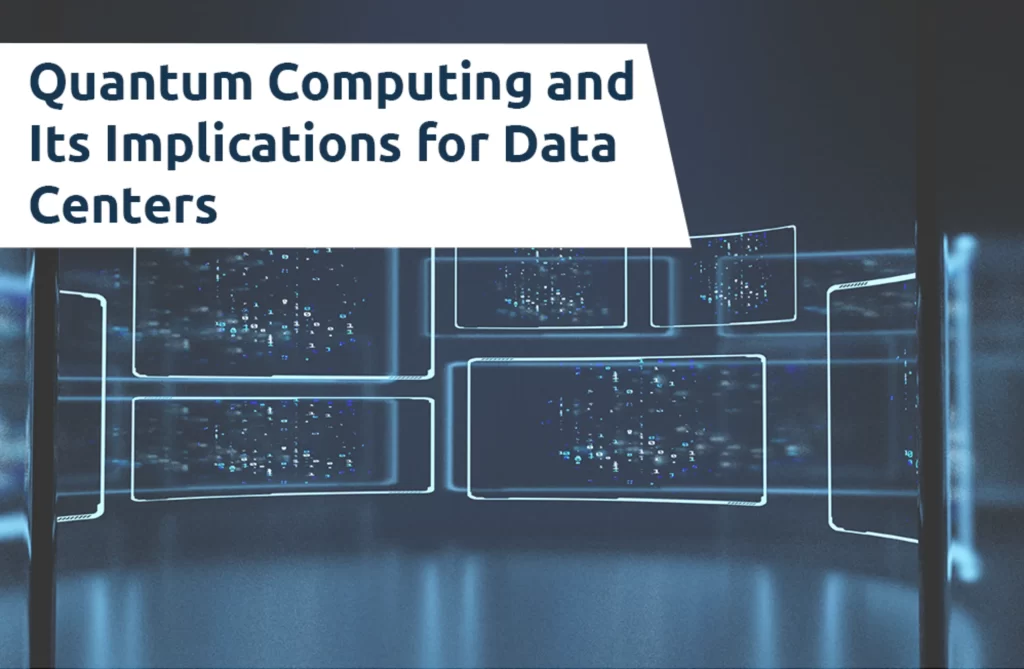Quantum Computing and Its Impact on Data Center
The rise of quantum computing is set to transfigure the computing landscape and disrupt data centers. With its immense potential, it promises to reshape industries and revolutionize the way we solve complex problems.
What is Quantum Computing?
computer science, and mathematics to solve problems faster than classical computers.”These computers have applications in machine learning, optimization, and simulating physical systems. Notable use cases include financial portfolio optimization and simulating chemical processes tasks that remain unsolvable by traditional supercomputers.
Why is Quantum Computing Important?
Quantum computing technology is advancing quickly, With investments expected to surpass $9.1 billion by 2030 (according to Tractica reports). It enables the resolution of problems that classical computers cannot address, offering new opportunities in optimization, machine learning, sampling, and simulation. Quantum advances will improve manufacturing testing, optimize traffic and route planning, accelerate drug development, and refine financial modeling.
However, quantum computing also raises significant security concerns. Classical encryption methods, which rely on complex problems solved over long periods, could be easily bypassed by quantum machines. This threat has led to the rise of post-quantum cryptography, a suite of evolving protocols to protect data in a quantum world.
Operating Principles of Quantum Computing
Quantum computers differ from classical systems in their ability to explore many possibilities at once, rather than sequentially. This parallelism offers a massive computational advantage. Currently, breakthroughs in quantum computing are poised to transform industries such as IT, finance, healthcare, aerospace, and defense, solving previously unsolvable problems.
Potential applications include:
- Optimization: Improving supply chain processes and logistics.
- Simulation: Enabling complex quantum system simulations, benefiting chemistry and materials science.
- Cryptography: Developing secure communication methods essential for data security.
Quantum algorithms like Shor’s and Grover’s offer faster problem-solving and optimization capabilities.
Understanding Quantum Computing
Quantum computing exciting and complex technologies on the horizon, pushing the boundaries of computer science. As McKinsey describes, it uses the principles of quantum mechanics to quickly solve complex problems that would otherwise take classical computers an impractical amount of time.
Key concepts include:
- Qubits: Quantum knowledge, capable of existing in various states simultaneously through superposition.
- Superposition: A phenomenon that allows qubits to represent multiple states at once, enabling massive parallel computation.
- Entanglement: A quantum property that connects qubits, allowing instantaneous data transfer regardless of long distance.

Quantum Computing and Artificial Intelligence
They set to artificial intelligence by accelerating machine learning algorithms and creating sophisticated AI systems.
Impact of Quantum Computing Data Center
Expected to Quantum computing has significant implications for data centers. While still emerging, it promises to alter the way data centers operate. To fully integrate quantum capabilities, data centers will need to overhaul their infrastructure. Quantum computing will improve performance but also present new challenges for operators.
Data Center Preparation Strategies
Datacenter preparation involves streamlining data management and consolidating storage systems. This process focuses on reducing the number of storage systems without changing the data volume, ensuring the infrastructure can support quantum computing’s processing needs. Proper preparation will be essential for integrating quantum computing into data centers.
Quantum Computers in Data Centers
2024 marks a key year for quantum computing with global investments driving the commercialization of the technology. Quantum computers in data centers boost sectors like finance and energy, with milestones including Quantum Brilliance at Pawsey and Oxford Quantum Circuit’s partnerships with Cyxtera and Fujitsu-CESGA.
Quantum Algorithms and Their Applications
The algorithms harness the power of quantum computing to solve complex problems faster than classical systems. Key algorithms include:
- Shor’s Algorithm: Used for factoring large numbers, with implications for breaking traditional encryption.
- Grover’s Algorithm: Permits quick searches through unsorted databases.
- Quantum Simulation Algorithms: Simulate quantum systems for drug discovery, materials science, and chemistry.
Potential Applications in Various Fields
Quantum computing can be applied across numerous industries, including:
- Drug Discovery: Modeling molecular interactions to create new drug formulations.
- Finance: Optimizing portfolios and improving risk management.
- Materials Science: Developing materials with enhanced properties.
- Artificial Intelligence: Accelerating machine learning and AI algorithms.
- Logistics: Transportation optimization And Provide Supply chain.
- Energy: Developing and Designing more efficient solar cells and batteries.

FAQ for Quantum Computing
- What is Quantum Computing?
- Quantum computing combines principles of computer science, physics, and mathematics to solve complex problems faster than classical computers. It has applications in machine learning, optimization, and simulating physical systems.
- How does Quantum Computing impact data centers?
- Quantum computing has the potential to transform data centers by enhancing performance, enabling real-time problem-solving, and offering new opportunities. However, it requires significant infrastructure changes to support quantum capabilities.
- Why is Quantum Computing important?
- Quantum computing is important because it can solve problems that classical computers cannot, offering advancements in areas like optimization, machine learning, drug development, and financial modeling. It also presents new challenges in data security, leading to post-quantum cryptography development.
- What are Quantum Algorithms and their applications?
- Quantum algorithms like Shor’s and Grover’s are designed to solve problems faster than classical algorithms. They can be applied in fields such as cryptography, drug discovery, optimization, and database searches.
- How will Quantum Computing affect industries?
- Quantum computing will revolutionize industries like IT, finance, healthcare, aerospace, and energy by solving complex problems in areas like logistics, materials science, and AI, thereby creating new opportunities and improving existing systems.






